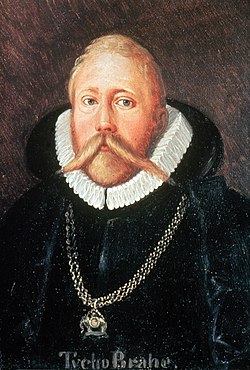http://en.wikipedia.org/wiki/Tycho_Brahe wrote:
<<Tycho Brahe (14 December 1546 – 24 October 1601), born
Tyge Ottesen Brahe, was a Danish nobleman known for his accurate and comprehensive astronomical and planetary observations. Coming from Scania, then part of Denmark, now part of modern-day Sweden, Tycho was well known in his lifetime as an astronomer and alchemist. Tycho Brahe was granted an estate on the island of Hven and the funding to build the Uraniborg, an early research institute, where he built large astronomical instruments and took many careful measurements, and later Stjerneborg, underground, when he discovered that his instruments in the former were not sufficiently steady. After disagreements with the new Danish king in 1597, he was invited by the Bohemian king and Holy Roman emperor Rudolph II to Prague, where he became the official imperial astronomer. He built the new observatory at Benátky nad Jizerou. Here, from 1600 until his death in 1601, he was assisted by Johannes Kepler. Kepler later used Tycho's astronomical results to develop his own theories of astronomy.
Tycho was said to own one percent of the entire wealth of Denmark at one point in the 1580s and he often held large social gatherings in his castle. He kept
a dwarf named Jepp (whom Tycho believed to be clairvoyant) as a court jester who sat under the table during dinner. Pierre Gassendi wrote that Tycho also had a tame elk (moose) and that his mentor the Landgrave Wilhelm of Hesse-Kassel (Hesse-Cassel) asked whether there was an animal faster than a deer. Tycho replied, writing that there was none, but he could send his tame elk. When Wilhelm replied he would accept one in exchange for a horse, Tycho replied with the sad news that the elk had just died on a visit to entertain a nobleman at Landskrona. Apparently during dinner the elk had drunk a lot of beer, fallen down the stairs, and died.
Tycho suddenly contracted a bladder ailment after attending a banquet in Prague, and died eleven days later, on 24 October 1601. According to Kepler's first hand account, Tycho had refused to leave the banquet to relieve himself because it would have been a breach of etiquette. After he had returned home he was no longer able to urinate, except, eventually, in very small quantities and with excruciating pain. The night before he died he suffered from a delirium during which he was frequently heard to exclaim that he hoped he would not seem to have lived in vain. Before dying, he urged Kepler to finish the Rudolphine Tables and expressed the hope that he would do so by adopting Tycho's own planetary system, rather than Copernicus's. A contemporary physician attributed his death to a kidney stone, but no kidney stones were found during an autopsy performed after his body was exhumed in 1901, and the modern medical assessment is that it is more likely to have resulted from uremia.
Recent investigations have suggested that Tycho did not die from urinary problems but instead from mercury poisoning—extremely toxic levels of it have been found in hairs from his moustache. The results were, however, not conclusive. Prague City Hall approved a request by Danish scientists to exhume the remains in February 2010, and a team of Czech and Danish scientists from Aarhus University arrived in November 2010, to take bone, hair and clothing samples for analysis.>>






